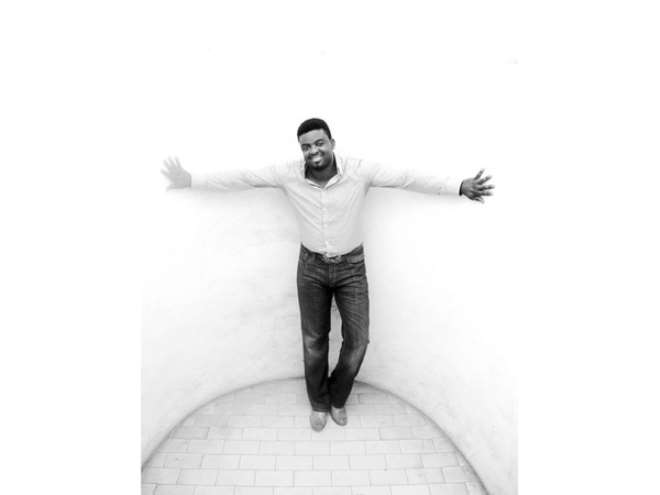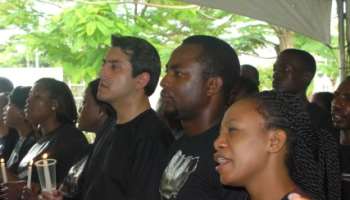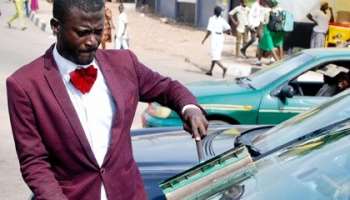Telling Our Stories---Kunle Afolayan
If you hadn't heard about filmmaker Kunle Afolayan prior to 2009, you certainly did that year. His new movie, The Figurine, which he starred in and which was shot with an all-Nigerian crew, was released to rave reviews and packed cinemas across the country and abroad. Just last weekend, The Figurine won best cinematography, best visual effects, best film from Nigeria, and best picture awards at the 2010 African Movie Academy Awards. The movie has also shown at film festivals all over the world including the London African Film Festival, the Rotterdam International Film Festival, the Tarifa International Film Festival in Spain, the African Film Festival in Tokyo, and the Edinburgh International Film Festival.
Which is why I was surprised when the filmmaker agreed to be interviewed just one day after I called him to schedule a chat. But I soon found out why. He was travelling for the New York African Film Festival and would not be available for a while. When I got to his office in Ikeja, Lagos, he had not arrived. He had to run to the bank because the next day was a public holiday but he would be with me soon. When he arrived, I said: “I am sure if we were on a movie set, you would have come right on time.” He smiled, grabbed a few things from the car, and led me into his office.
His father's child
Kunle is the son of legendary film actor Adeyemi Afolayan popularly known as “Ade Love” of Taxi Driver and Iyaniwura fame. The filmmaker, who is in his mid-thirties, was raised in Ebute-Metta, Lagos.
“I grew up on the streets like the average hustling Nigerian kid and due to the nature of my parents' jobs, I used to hop from one cinema to the other,” said the married father of two who is expecting a third child with his wife, Tolulope.
He went to secondary school in Kwara State, and then on to Lagos State Polytechnic where he studied business administration.
He got a job at City Express Bank, formerly known as Industrial bank, where he worked for seven years. While working at the bank, he made his first acting appearance in Saworo-Ide in 1998, a film by renowned filmmaker Tunde Kelani.
“After the bank, I was home for eight months researching on what I wanted to do,” he said.
He eventually decided to attend the New York Film Academy where he majored in digital filmmaking. There, he produced two short films — Life is Short and Triangle of Need.
After finishing film school in 2005, Kunle set up a production company called Golden Effect where he produced his first feature film, Irapada, which earned him the best indigenous film Award at AMAA in 2007. It was also the first Nigerian movie to show at the Silverbird Cinemas. “I got the Afro-Hollywood Award in 2004, best actor at the Nollywood Award of Excellence, and the list goes on,” he said.
After Irapada he decided to take a break from work.
“I participated in Celebrity Takes 2 (dance competition) because it was an opportunity to let loose, mix with friends and learn a few “oyinbo” (western) dance steps,” he said, adding that although he did not win, he was glad he was not the first to be voted off the show.
Filming Figurine
A synopsis of the movie on online film database, IMDB.com, reads: “The Figurine is a story of two male buddies and a girl — all down on their luck — who have their lives changed when one of them discovers Araromire, a mysterious figurine in an abandoned shrine which, according to legend, bestows seven years of good luck. But no one told them about the next seven years...”
According to Kunle, the story was inspired by people and what they believe.
“Nigeria is such a country where everybody seems to believe in different gods, and when things happen, we put all the blame on these gods,” said the filmmaker. “This is the story I tried to tell in The Figurine.”
He said that selecting the cast for the movie, which also featured actors Ramsey Nouah (who won best actor AMAA 2010 for his role), Omoni Oboli and Funlola Aofiyebi, was tough.
“Most of the people in the industry are not used to working for long periods, and I was looking at doing something that might take five to six weeks,” he said. “Maybe it is because I went to film school. I do not compromise on sound, original sound tracks, pictures and story-telling style.”
Filming would eventually last 12 weeks, thanks to a number of challenges.
“While taking the equipment and crew over the sea to shoot in a beach house, the generator fell in [the water],” he said. “But we worked around it.”
The movie, which cost N50 million to make, was the biggest financial risk the filmmaker had ever taken in his career. The money came from his own personal savings, support from corporate organisations and bank loans. The filmmaker had said earlier that the movie was released straight to cinema to deter piracy. Even now, he has only recouped half of his investment, but he said that the DVD would not be sold until there was a plan to move at least one million copies.
“I want to tell our stories the way they should be told from an African's perspective,” he said.
But aren't South African movie makers already doing that?
“Most of the South African films were done by Hollywood studios,” he said. “And when you get grants or funding from a white organisation, they influence your story.”
Full Circle
Don't expect that Kunle is still living on a The Figurine high. The driven filmmaker is keeping himself busy and has taken on new projects.
“I am going to produce a feature film for a multi-national company in the third quarter of the year,” he said. “The script is ready, and I am doing pre-production. I collaborated with audio visual to shoot a commercial for Guinness, and in a few weeks, I will be shooting three sets of commercials for a local airline in Nigeria.”
Even though Ade Love was never crazy about his son going into filmmaking, Kunle, every now and then, wishes his father was alive to see his accomplishments.
“I was watching Taxi Driver... and I saw so many errors,” he said. “I wished he was alive so I could say, 'Sir, this is crossing the line'. This was the first time I would ever miss him.”
Latest News
-
 "If You're For Me, I Am For You" - Cubana Chief P
"If You're For Me, I Am For You" - Cubana Chief P -
 "3 Days To Go" - Femi Adebayo Urges Fans To Get S
"3 Days To Go" - Femi Adebayo Urges Fans To Get S -
 "Stop Asking Me Questions About Speed Darlington"
"Stop Asking Me Questions About Speed Darlington" -
 "Benue Is The Most Underdeveloped State I've Ever
"Benue Is The Most Underdeveloped State I've Ever -
 Stan Alieke Urges Young Professionals To Take Lin
Stan Alieke Urges Young Professionals To Take Lin -
 Chizzy Alichi Teases Fans With Baby Reveal, Promot
Chizzy Alichi Teases Fans With Baby Reveal, Promot -
 "I'm Not Wearing Makeup From July 4th Till Decemb
"I'm Not Wearing Makeup From July 4th Till Decemb -
 "Stop The Challenge Of Mocking Kids With Down Syn
"Stop The Challenge Of Mocking Kids With Down Syn -
 Regina Daniels Celebrates Sons As They Mark Birthd
Regina Daniels Celebrates Sons As They Mark Birthd -
 Speed Darlington Threatens To Sue NAPTIP For Defam
Speed Darlington Threatens To Sue NAPTIP For Defam














